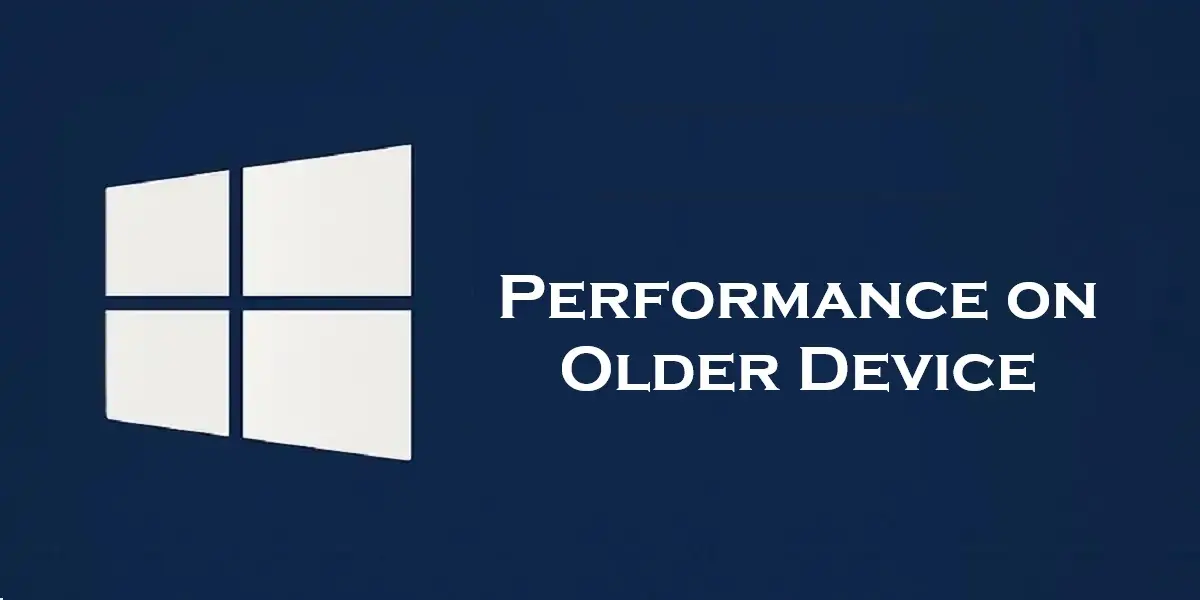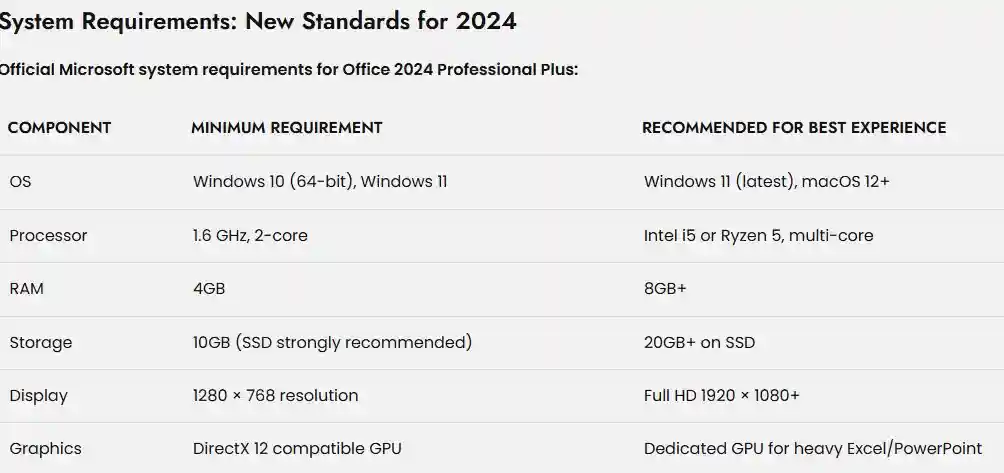Performance on Older Devices

Introduction
For millions of users worldwide, keeping older computers productive means maximizing both performance and value. As Microsoft releases Office 2024 Professional Plus with modern AI and collaboration tools, one burning question emerges: Will it run smoothly on my old PC? This definitive guide explores technical requirements, expert advice, practical optimization, and user reviews—always referencing the pillar resource: Office 2024 professional plus: Features, Benefits & Reviews. You'll also find five trusted internal links and five authoritative external resources to inform your smart upgrade.

Official Microsoft system requirements for Office 2024 Professional Plus:
32-bit OS are not supported: Office 2024 is exclusively for 64-bit environments.
Windows 8.1 and below are NOT supported. If you’re running Windows 7/8/8.1, an OS upgrade is essential before installing.
Internet connection is vital for activation, updates, and AI-driven features.
Bottom line: Devices from 2017 or newer with Windows 10/11 generally meet or exceed these specs. PCs older than this may need upgrades, especially more RAM and SSDs.
2. How Office 2024’s Updates Affect Performance
Performance Impact vs. Prior Versions:
Office 2024 is optimized for speed: Faster launches, snapper in-app navigation, and reduced lag in Excel/Word workloads.
Heavier AI and cloud tools: Real-time collaboration, smart suggestions, and analytics are more demanding on memory, CPU, and bandwidth.
Larger install footprint: Office 2024 can require more storage, making SSDs far preferable to older spinning hard drives.
Good news:
For compatible older hardware (i.e., dual-core CPUs, 4GB+ RAM, SSD, Windows 10/11), Office 2024 generally outpaces Office 2016/2019 in launching, file handling, and complex calculations.
Caveat:
On “borderline” old hardware (just 4GB RAM, old HDD, weak integrated graphics) AI-powered tasks and advanced live collaboration can make the suite sluggish.
3. User Reviews: Successes and Struggles on Older Hardware
Positive Experiences
“Installed Office 2024 on my five-year-old Dell, running Windows 10. Other than a one-time wait during installation, it opens faster than Office 2016 and handles spreadsheets well. PowerPoint live features run slightly slower but are usable.”
“Upgraded my laptop’s HDD to SSD and RAM to 8GB before installing—huge performance boost in both Windows and Office apps.”
Common Complaints
“Tried installing on an old Lenovo desktop (2014, 2GB RAM, HDD)—installer blocked installation due to 32-bit Win 8.1.”
“AI features lag badly with only 4GB RAM. Excel’s smart fill and analysis slow down when multiple apps are running.”
“Office crashed during a big PowerPoint export—likely because my old machine was low on free disk space and RAM.”
Expert Commentary
Reviews highlight that Office 2024’s performance edge is only realized on devices meeting or exceeding minimum specs. AI and collaboration tools, while impressive, are best on newer, multi-core systems with SSDs.
4. Making Office 2024 Run Smoother: Pro Tips
If you’re upgrading an older device, use these strategies:
Upgrade RAM to at least 8GB: Especially if multitasking or using AI features.
Switch to an SSD: Makes loading times, updating, and overall responsiveness dramatically better—even on old processors.
Disable unnecessary background programs: Free up RAM and reduce CPU competition.
Keep Windows updated: Many Office features rely on the latest OS security and feature packs.
Run in “classic” mode: Turn off real-time AI/collaboration tools to reduce system load (where possible).
Reduce add-ins and extensions: Too many plugins slow down launch and task performance.
Start with a clean install: Uninstall all previous Office versions and clean up system temp files.
5. Workarounds and Alternatives for Very Old Devices
Stuck with a device that can’t run Office 2024? Consider:
Stick to Office 2016/2019 for basic word processing or spreadsheets.
Cloud alternatives: Use Microsoft 365 web apps, Google Docs, or WPS Office online—these run in browsers regardless of your local specs.
Lightweight Linux-based office suites: LibreOffice is an open-source alternative for legacy computers.
Remote access: Run Office 2024 on a newer home/office PC and access via remote desktop.
6. Comparisons with Office 2016, 2019, and 2021
Office 2024 requires more modern hardware and drops support for older OS.
Office 2016/2019 may remain better choices for legacy PCs with less RAM or storage, or 32-bit OS.

Frequently Asked Questions (FAQs)
No. Office 2024 is designed for Windows 10 (64-bit) and Windows 11. Earlier OS are not supported or secure
It is just enough for basic tasks, but 8GB is highly recommended for users leveraging AI, sharing, or working with large files
If your device meets or exceeds specs and has an SSD, performance will likely improve or at least match that of Office 2019/2021. Low RAM or an HDD will cause potential slowdowns.
Office 2024 offers ongoing security and AI-powered threat protection, making it both safer and faster than older releases.
You can, but updates—including vital security patches—will end.
Conclusion: Should You Upgrade Your Old PC?
Office 2024 Professional Plus combines blazing new features, AI, and collaboration—but only delivers full value on eligible hardware. For older PCs and laptops, the upgrade is a clear win if your device runs 64-bit Windows 10/11, has 4GB+ RAM, and ideally an SSD. Budget users with weaker hardware may want to stick with supported Office 2016/2019 or look to browser-based alternatives.
